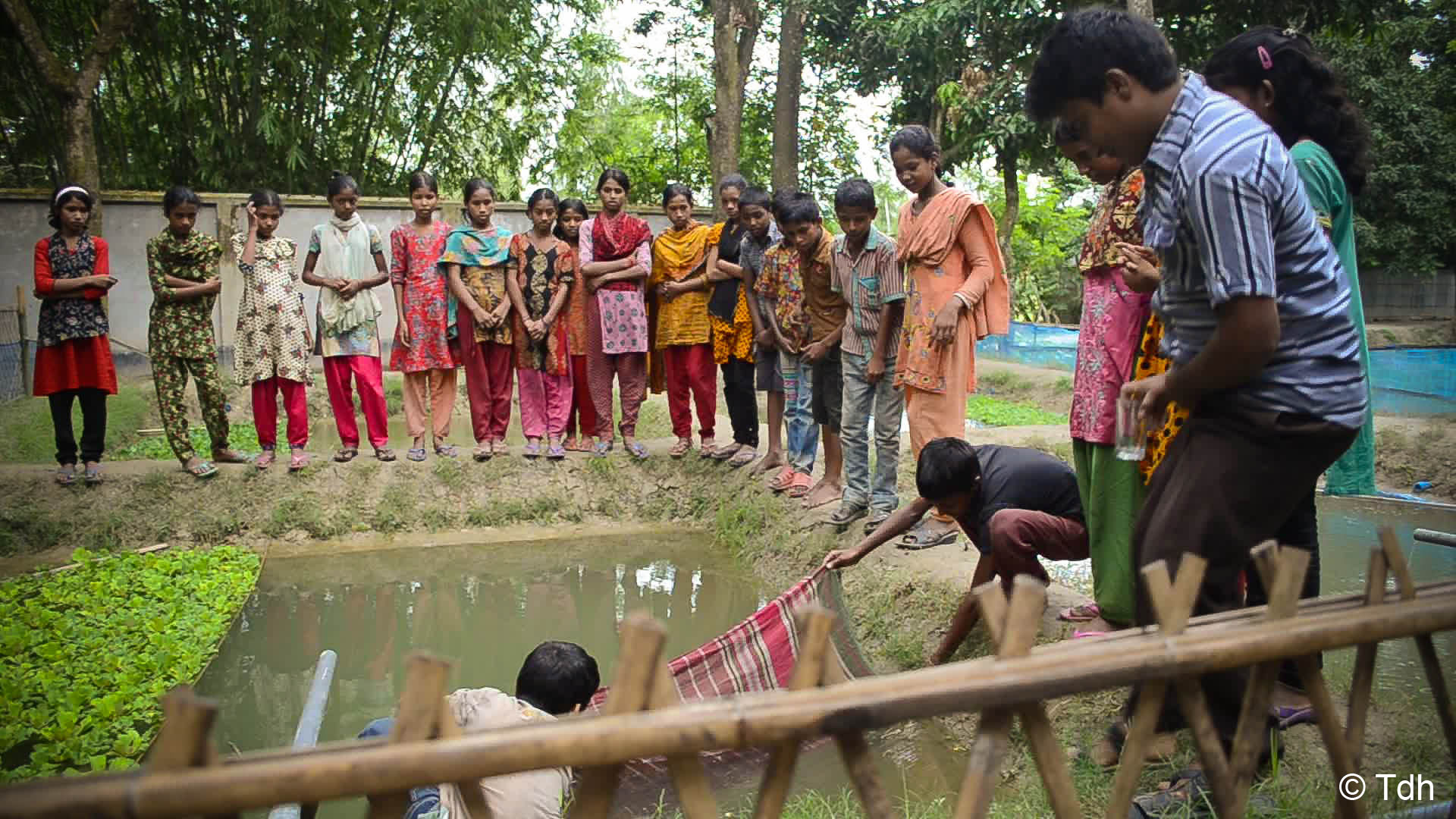
Terre des hommes, Foundation টেরে ডেস্ হোমস্ এর সেবা সমূহ
Rehabilitation of Union Health & Family Welfare Centers
Operation of Specialized Nutrition Unit (SNU)

Tdh has been running SNU for the facility level management of severe acute malnutrition (SAM) among the under five children following international/national guideline since 1997. The SAM children with other associate health complications are in risk of morbidity and mortality unless they are treated at facility level under specialized care. Every year Tdh admits average 350 SAM children in this unit and treated at free of cost along with food and accomodation for the children mother/caregivers. As Tdh has formal agreement with MoH&FW and Tdh receives regular supply of formula milk ( F75 and F100) from IPHN for the treatment of SAM children in its unit. The SNU is capacited with 25 beds including isolation unit, trained and skill doctor, nurses and other supported staff for running the unit as international standard.
Rehabilitation of Community Clinics

The Ministry of Health and Family Welfare’s (MoHFW) Community Clinics (CC) provide primary health care services, although with limited human resources, capacities and medical supplies.
Tdh is working in collaboration with health authorities to increase the impact of the services provided by supporting the rehabilitation of clinic buildings including access to safe drinking water, sanitation facilities, extension of space to conduct awareness sessions and to deliver appropriate care.
Tdh has started to rehabilitate the community clinics since 2014, and as of 2017 covered and completed rehabilitation works for 104 CCs in Sadar, Ulipur, Chilmamri, Nageswari and Fullbaru Upazila with active involvement of CC management committees (Community Groups).
Tdh expanded its working area in all nine Upazila of Kurigram district from 2018 and importantly has taken into consideration this activity subject to availability of funding source for newly extended areas. Tdh has been working with 271 community clinics in Kurigram district for their functionality and supporting to the government health system.
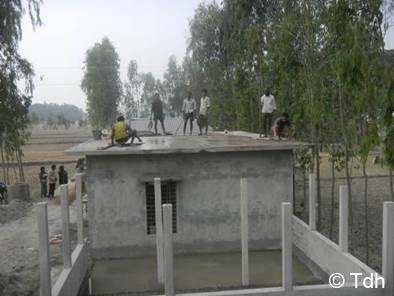

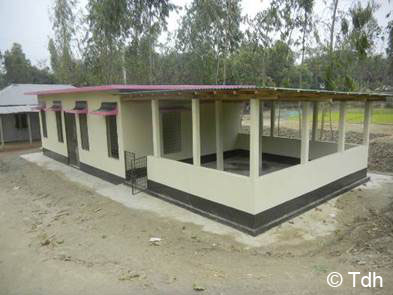
Mother and Child Health

The daily activities implemented by Tdh are focused on prevention, treatment and management of malnutrition, and the development of knowledge, skills and practices. Mothers and children benefit from facilitated access to primary health care and increase capacities to prevent disease for themselves and their dependents.
Through the integration of MCH services in health facilities, primary health care is made more comprehensive in targeted health facilities. These services contribute to improve management of childhood illness and maternal health, which consequently improves the health status of children, pregnant women and mothers.
Integrated Management of Childhood Illness
General health services and prevention of malnutrition are combined to ensure proper child development. Tdh addresses child diseases like diarrhea, respiratory infections, measles, within an integrated Health and Nutrition project. Mothers receive also education on immunization awareness and fever management.
A team of field workers (community volunteers) is daily engaged in the community to identify new pregnant mothers, to promote antenatal care and to conduct individual follow-up, nutrition screening to under five children and identify malnourish cases and refer to the CC/UHFWC for their management.
Caring for pregnant and lactating women
Awareness is raised and information on hygiene practices is shared with pregnant and lactating women. Tdh helps preventing the risks linked to pregnancy, ensures ante-and post-natal care, and encourages exclusive breastfeeding during the first six months of life. Specific education is also provided to prevent pregnancies of adolescents, and to promote maternal health and family planning.
Key activities include:
►Adequate education and counselling for instilling positive behavioural changes
►Training, guidance and monitoring of health and field workers
►Capacity development of government community health staff
►Provision of primary health care to children under five years
►Ante and Post Natal Care
►Referral of high risk pregnancies for institutional delivery
►Community mobilization for care seeking from appropriate health facilities at community and Upazila/district level
The activities are implemented in cooperation and formal partnership with the Community Based Health Care (CBHC)/DGHS, National Nutrition Services (NNS)/Institute of Public Health and Nutrition (IPHN)/DGHS, DGFP under the Ministry of Health and Family Welfare.
Field operations involve community members and leaders. Coordination with service providers and authorities is strengthened.
Mother and Child Nutrition

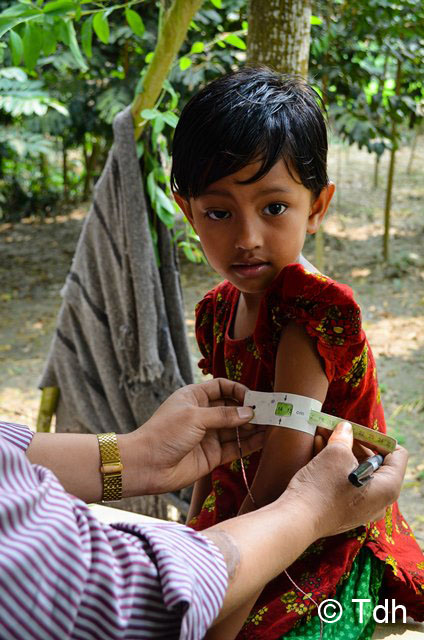 The prevention of acute malnutrition is carried out in nutrition centers in the community and in the government’s community clinics. The mothers are trained and sensitized on topics like exclusive breastfeeding and appropriate cooking to ensure a healthy and appropriate diet for children.
The prevention of acute malnutrition is carried out in nutrition centers in the community and in the government’s community clinics. The mothers are trained and sensitized on topics like exclusive breastfeeding and appropriate cooking to ensure a healthy and appropriate diet for children.
Provision of care for malnourished children and mothers
Most cases of moderate malnutrition can be treated in the community with MNP supplementation along with normal food. The community volunteers/GoB health workers screen to under five children with MUAC and identify the malnourish cases and refer them to CC/UHFWC for their management. The SAM cases mainly referred to the facility level management at Upazila/district hospital or to Tdh SNU for specialized care as per national guideline. The MAM chhildren visits to Tdh weekly/fortnightly treats affected children as well as pregnant and lactating women, while counselling the mothers. Children with complications are referred to Tdh’s Specialized Nutrition Unit.
Key activities include:
► Capacity development of government‘s community health staff for implementing Community Management of Acute Malnutrition.
►Screening in the community
►Growth monitoring sessions
►Home visits
►Cooking demonstrations
DRR (Disaster Risk Reduction)

In August 2014, the low-lying, vulnerable and densely populated areas of Kurigram District were affected by severe flooding following the monsoon.
Tdh immediately responded during and after the floods and coordinated its interventions with government and other NGOs. Affected people have been supported by Tdh with cash, and hygiene items to satisfy their immediate needs. Cash transfer was organized for households that lost crops to allow them to restore their livelihoods.
Moreover, households received income to create assets, repair existing community infrastructure like roads or raised the plinths of low lying houses. In addition to satisfy their acute needs, this will increase their coping capacities in future floods. With the raised plinths, the houses become flood resistant.
Vulnerable households in the worst flood affected areas received seed support that allowed them to start own maintain vegetable production, increase food security and prevent malnutrition.
Water, Sanitation and Hygiene

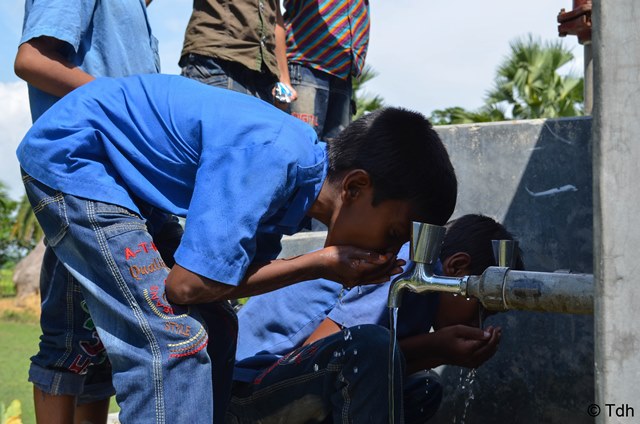 After providing access to drinking water and sanitation systems in selected working areas during the last years, Tdh WASH team delivered trainings and awareness meetings on hygiene issues.
After providing access to drinking water and sanitation systems in selected working areas during the last years, Tdh WASH team delivered trainings and awareness meetings on hygiene issues.
Through WASH committee meetings (and management committees of community clinics and schools) monitoring and maintenance of WASH facilities is ensured.
Child group, mother group discussions, campaign sessions and individual counselling are continuously conducted at community level to deliver messages on hygiene issues such as personal hygiene, critical times and rules of hand washing, use of sanitary latrines, safe water, and prevention of diarrhea. To complete its work and promote behavior change, Tdh has installed hand washing stations (Tippy-Taps) in communities and schools.
Through the realization of the children’s right to sufficient, safe, acceptable, accessible and affordable water and sanitation, Tdh reduces health threats related to low water quality.
A baseline assessment was conducted on WASH related knowledge, facilities and practices at household level. The findings generated from the assessment is used to develop the strategic plan for 2015-17.
Homestead Vegetable Gardening

Keyhole Gardens
To incre ase resilience of families in food-prone poverty pockets, Tdh promotes “Keyhole Gardens”. These disaster resistant homestead gardens are highly productive due to an integrated compost unit, produce different vegetables in all seasons, and require only low inputs. Women build, maintain and monitor the gardens while sharing seeds and tools among each other. Increased vegetable consumption directly increases people’s intake of micronutrients and vitamins.
ase resilience of families in food-prone poverty pockets, Tdh promotes “Keyhole Gardens”. These disaster resistant homestead gardens are highly productive due to an integrated compost unit, produce different vegetables in all seasons, and require only low inputs. Women build, maintain and monitor the gardens while sharing seeds and tools among each other. Increased vegetable consumption directly increases people’s intake of micronutrients and vitamins.
